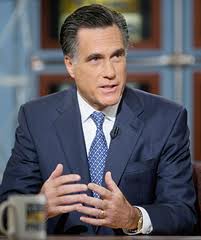Republican presidential nominee Mitt Romney emphasized expanded school choice in his acceptance speech tonight, listing it as the second of five steps to turn America around.
"We’ll give our fellow citizens the skills they need for the jobs of today and the careers of tomorrow," Romney said. "When it comes to the school your child will attend, every parent should have a choice and every child should have a chance.”
School choice followed energy independence on the list, and preceded his call for new trade agreements, cutting the deficit and strengthening small businesses.
Romney has called for federal funding for low-income and special education students to follow the student to the schools their parents choose, including private schools. He has also proposed eliminating caps on charter and digital schools. (For more detail and analysis of his proposals, read these redefinED posts here and here, and this guest op-ed by the Fordham Institute's Checker Finn here.)
Romney's speech mentioned education in two other places.
* "I am running for president to help create a better future. A future where everyone who wants a job can find one. Where no senior fears for the security of their retirement. An America where every parent knows that their child will get an education that leads them to a good job and a bright horizon."
* "You might have asked yourself if these last years are really the America we want, the America won for us by the greatest generation. Does the America we want borrow a trillion dollars from China? No. Does it fail to find the jobs that are needed for 23 million people and for half the kids graduating from college? No. Are its schools lagging behind the rest of the developed world? No."
Entire speech here.
 Mitt Romney’s white paper on education, “A Chance for Every Child,” offers laudable support for increased parental choice and for other changes, such as tenure reform, that must occur to improve education in America. Like Obama, Romney wants to leverage federal dollars to move states in the right direction on public school choice, especially the removal of charter school caps and the adoption of open enrollment policies. He also advocates for private school choice “where permitted by state law.”
Mitt Romney’s white paper on education, “A Chance for Every Child,” offers laudable support for increased parental choice and for other changes, such as tenure reform, that must occur to improve education in America. Like Obama, Romney wants to leverage federal dollars to move states in the right direction on public school choice, especially the removal of charter school caps and the adoption of open enrollment policies. He also advocates for private school choice “where permitted by state law.”
But is his plan viable? And will he lead to implement it?
Romney would remove most of No Child Left Behind’s accountability standards in favor of expanded reporting on how schools are different. He would allow states to set their own standards and tests, but print the state’s National Assessment of Educational Progress (NAEP) outcomes on school and district report cards. NAEP brings much value to the discussion of education performance in America, but none to how an individual school district or school is performing because it does not test sufficient numbers or in every school and district. Implicit in this move - away from accountability by achievement measures towards improved information about schools - is that such information is lacking today. But parents are actually quite knowledgeable about local schools’ pluses and minuses and can access sites such as www.Greatschools.org for more detailed information.
So, for this information to be vastly more empowering than it is today, Romney recognizes that school choice would have to be dramatically expanded. That’s especially true for public school choice where, frankly, most of the schools will be for the foreseeable future.
The Romney plan seeks to expand choice primarily in two ways. First, he would convert Title 1 and federal special education (IDEA) funds that go to schools serving economically disadvantaged students. They would become vouchers that the eligible Title 1 and special ed students could take to any other school, including a private school, or even to a tutoring provider or digital school. Second, he would require states, as a condition for receiving these funds, to adopt open enrollment policies and eliminate caps on charter and digital schools.
The Title 1 and IDEA proposal is worthy of consideration. (more…)